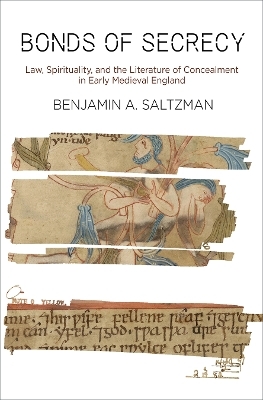
Bonds of Secrecy
University of Pennsylvania Press (Verlag)
978-1-5128-2790-3 (ISBN)
- Noch nicht erschienen (ca. Februar 2025)
- Versandkostenfrei
- Auch auf Rechnung
- Artikel merken
What did it mean to keep a secret in early medieval England? It was a period during which the experience of secrecy was intensely bound to the belief that God knew all human secrets, yet the secrets of God remained unknowable to human beings. In Bonds of Secrecy, Benjamin A. Saltzman argues that this double-edged conception of secrecy and divinity profoundly affected the way believers acted and thought as subjects under the law, as the devout within monasteries, and as readers before books. One crucial way it did so was by forming an ethical relationship between the self and the world that was fundamentally different from its modern reflex. Whereas today the bearers of secrets might be judged for the consequences of their reticence or disclosure, Saltzman observes, in the early Middle Ages a person attempting to conceal a secret was judged for believing he or she could conceal it from God. In other words, to attempt to hide from God was to become ensnared in a serious sin, but to hide from the world while deliberately and humbly submitting to God's constant observation was often a hallmark of spiritual virtue.
Looking to law codes and religious architecture, hagiographies and riddles, Bonds of Secrecy shows how legal and monastic institutions harnessed the pervasive and complex belief in God's omniscience to produce an intense culture of scrutiny and a radical ethics of secrecy founded on the individual's belief that nothing could be hidden from God. According to Saltzman, this ethics of secrecy not only informed early medieval notions of mental activity and ideas about the mind but also profoundly shaped the practices of literary interpretation in ways that can inform our own contemporary approaches to reading texts from the past.
Benjamin A. Saltzman teaches English at the University of Chicago.
A Note on References and Translations
List of Abbreviations
Introduction
PART I. LAW
Chapter 1. Political Epistemology and Crimes of Concealment in Anglo-Saxon Law
Chapter 2. The Secret Seized: Theft, Death, and Testimony
PART II. SPIRITUALITY
Chapter 3. Monastic Life and the Regulation of Secrecy
Chapter 4. Making Space for Spiritual Secrecy
Chapter 5. Seeing in Secret: Saints, Hagiography, and the Ethics of Concealment and Discovery
PART III. LITERATURE
Chapter 6. Binding Secrets, Solving Riddles
Chapter 7. Worldly Concealment, Divine Knowledge, and the Hermeneutics of Faith
Chapter 8. Reading Hidden Meaning: Between Interpretive Pride and Eschatological Humility
Afterword
Notes
Bibliography
Index
Acknowledgments
| Erscheint lt. Verlag | 4.2.2025 |
|---|---|
| Reihe/Serie | The Middle Ages Series |
| Zusatzinfo | 12 b/w illus. |
| Verlagsort | Pennsylvania |
| Sprache | englisch |
| Maße | 155 x 235 mm |
| Themenwelt | Geschichte ► Teilgebiete der Geschichte ► Religionsgeschichte |
| Religion / Theologie ► Christentum ► Kirchengeschichte | |
| Geisteswissenschaften ► Sprach- / Literaturwissenschaft ► Anglistik / Amerikanistik | |
| Geisteswissenschaften ► Sprach- / Literaturwissenschaft ► Literaturwissenschaft | |
| ISBN-10 | 1-5128-2790-8 / 1512827908 |
| ISBN-13 | 978-1-5128-2790-3 / 9781512827903 |
| Zustand | Neuware |
| Informationen gemäß Produktsicherheitsverordnung (GPSR) | |
| Haben Sie eine Frage zum Produkt? |
aus dem Bereich


